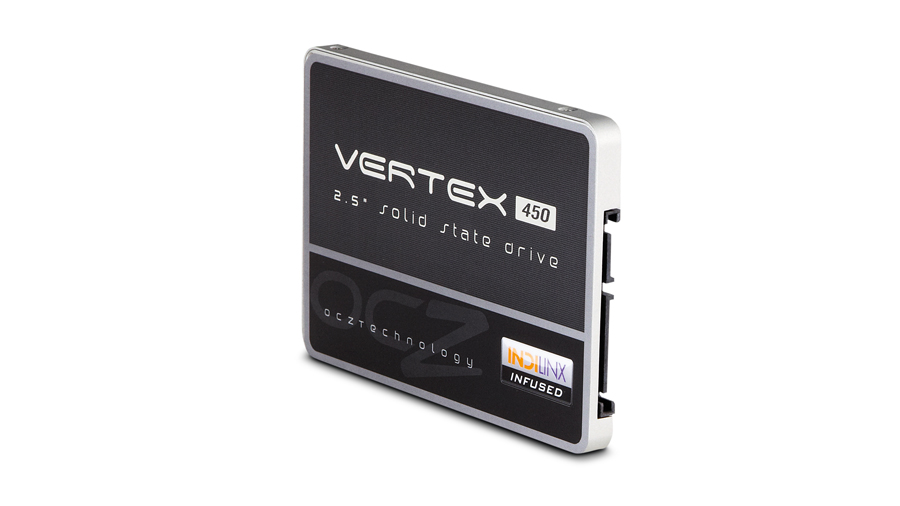TechRadar Verdict
Pros
- +
Very competitve speeds
- +
In-house firmware
- +
Nipping at the heels of the Samsung Pro drive
Cons
- -
Random read speed could be better
- -
Pricey
Why you can trust TechRadar
The OCZ Vertex 450 is a beacon of hope and courage in the face of almost totalitarian power. In financial terms, OCZ is but a rounding error on Samsung's balance sheet, so we doff our hats to the firm for bringing this competitive SSD to market.
This is no simple re-badge job. Nor does OCZ simply half-inch components from other companies' shelves. (Well, it does have to take memory chips from the open market. For the record, OCZ uses Micron's 20nm MLC NAND.)
No, the impressive bit is that OCZ makes its own controller chipset. At least, that's the case as far as we can tell. OCZ has previously made claims in this area that didn't quite hold up, but the latest Indilinx Barefoot 3 controller appears to be the real, proprietary deal.
Going by our benchmarks, we'd say that's true, because the 450 carves out something of a unique niche. A lot of our drives are very closely matched, but there are enough differences to make out a pattern.
Benchmarks
4K random read performance (incompressible)
AS SSD: Megabytes per second: Higher is better
A-Data XPG SX900 512GB: 23
Corsair Neutron GTX 240GB: 23
Crucial M500 480GB: 21
Intel 520 480GB: 24
OCZ Vertex 450 256GB: 19
Samsung 840 Pro 512GB: 26
Sandisk Extreme II 240GB: 23
Seagate 600 480GB: 22
Transcend SSD720 512GB: 20
Toshiba Q Series 256GB: 18
Zip file decompression
ZIP: Seconds: Quicker is better
A-Data XPG SX900 512GB: 23
Corsair Neutron GTX 240GB: 23
Crucial M500 480GB: 23
Intel 520 480GB: 24
OCZ Vertex 450 256GB: 23
Samsung 840 Pro 512GB: 24
Sandisk Extreme II 240GB: 23
Seagate 600 480GB: 23
Transcend SSD720 512GB: 24
Toshiba Q Series 256GB: 22
4K random write performance (incompressible)
AS SSD: Megabytes per second: Higher is better
A-Data XPG SX900 512GB: 18
Corsair Neutron GTX 240GB: 50
Crucial M500 480GB: 54
Intel 520 480GB: 19
OCZ Vertex 450 256GB: 54
Samsung 840 Pro 512GB: 51
Sandisk Extreme II 240GB: 54
Seagate 600 480GB: 44
Transcend SSD720 512GB: 18
Toshiba Q Series 256GB: 45
Sequential read performance (incompressible)
AS SSD: Megabytes per second: Higher is better
A-Data XPG SX900 512GB: 505
Corsair Neutron GTX 240GB: 503
Crucial M500 480GB: 492
Intel 520 480GB: 499
OCZ Vertex 450 256GB: 504
Samsung 840 Pro 512GB: 520
Sandisk Extreme II 240GB: 515
Seagate 600 480GB: 508
Transcend SSD720 512GB: 502
Toshiba Q Series 256GB: 514
Sequential read performance (compressible)
ATTO: Megabytes per second: Higher is better
A-Data XPG SX900 512GB: 551
Corsair Neutron GTX 240GB: 556
Crucial M500 480GB: 539
Intel 520 480GB: 545
OCZ Vertex 450 256GB: 551
Samsung 840 Pro 512GB: 561
Sandisk Extreme II 240GB: 555
Seagate 600 480GB: 554
Transcend SSD720 512GB: 538
Toshiba Q Series 256GB: 552
Sequential write performance (incompressible)
AS SSD: Megabytes per second: Higher is better
A-Data XPG SX900 512GB: 298
Corsair Neutron GTX 240GB: 470
Crucial M500 480GB: 414
Intel 520 480GB: 218
OCZ Vertex 450 256GB: 497
Samsung 840 Pro 512GB: 500
Sandisk Extreme II 240GB: 468
Seagate 600 480GB: 437
Transcend SSD720 512GB: 259
Toshiba Q Series 256GB: 469
Sequential write performance (compressible)
ATTO: Megabytes per second: Higher is better
A-Data XPG SX900 512GB: 519
Corsair Neutron GTX 240GB: 506
Crucial M500 480GB: 432
Intel 520 480GB: 475
OCZ Vertex 450 256GB: 534
Samsung 840 Pro 512GB: 535
Sandisk Extreme II 240GB: 518
Seagate 600 480GB: 473
Transcend SSD720 512GB: 465
Toshiba Q Series 256GB: 519
Verdict
The Vertex 450 is right up there in almost every metric. Sequential reads and writes are close enough to the competition that it hardly matters, and so are our application tests, though you can say that of every drive. Random write performance is as good as it gets, too.
The chink in the armour is random reads. Is 19MB/s versus, say, 26MB/s a disaster? Not really, but since random performance is the metric that most worries us, it's notable.
It's also a shame we couldn't get hold of the 512GB version to see how it fares against Samsung's.
Technology and cars. Increasingly the twain shall meet. Which is handy, because Jeremy (Twitter) is addicted to both. Long-time tech journalist, former editor of iCar magazine and incumbent car guru for T3 magazine, Jeremy reckons in-car technology is about to go thermonuclear. No, not exploding cars. That would be silly. And dangerous. But rather an explosive period of unprecedented innovation. Enjoy the ride.
